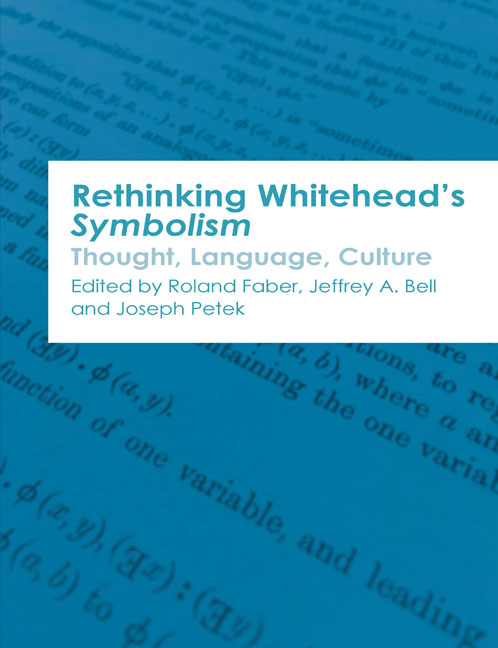Book contents
- Frontmatter
- Contents
- Abbreviations
- Introduction
- Part I Perception and Paradox
- Part II Adventures in Culture and Value
- 4 The Inhumanity of Symbolism
- 5 Reverence, Revision and Creaturely Life: Whitehead's Political Theology of Enjoyment
- 6 Ren and Causal Efficacy: Confucians and Whitehead on the Social Role of Symbolism
- 7 Avoiding a Fatal Error: Extending Whitehead's Symbolism Beyond Language
- Part III Misplaced Concreteness in Ethics and Science
- Notes on Contributors
- Index
6 - Ren and Causal Efficacy: Confucians and Whitehead on the Social Role of Symbolism
from Part II - Adventures in Culture and Value
Published online by Cambridge University Press: 23 June 2018
- Frontmatter
- Contents
- Abbreviations
- Introduction
- Part I Perception and Paradox
- Part II Adventures in Culture and Value
- 4 The Inhumanity of Symbolism
- 5 Reverence, Revision and Creaturely Life: Whitehead's Political Theology of Enjoyment
- 6 Ren and Causal Efficacy: Confucians and Whitehead on the Social Role of Symbolism
- 7 Avoiding a Fatal Error: Extending Whitehead's Symbolism Beyond Language
- Part III Misplaced Concreteness in Ethics and Science
- Notes on Contributors
- Index
Summary
The Confucians in East Asia have always dreamed of holding human communities together and constructing well-functioning polities in and through the binding and harmonising power of rituals. Underlying their trust in the power of rituals is the notion that rituals constitute symbolic articulation and enhancement of our affective responses to the conditions of embodied relationality and historicity in which we always already find ourselves. This Confucian theory of rituals resonates with Whitehead's theory of symbolism, insofar as the latter advances a fundamentally relational ontology of the subject by highlighting the hitherto neglected epistemological notion of perception in the mode of causal efficacy. In this chapter I will attempt a comparative analysis of the two theories in order to gain a fresh crosscultural perspective to appreciate Whitehead's implied critique of the modern liberal social theories that are based on a view of human beings as atomised individuals who rationally consent to enter society. My thesis is that both the Confucians and Whitehead offer theories of symbolic action predicated on radically relational understandings of the self, with Whitehead underscoring the historicity of causal connections among the high-grade organisms and the Confucians emphasising the primordiality of affective relations, especially within the context of the human family.
Whitehead on Symbolism
At the end of his Symbolism: Its Meaning and Effect, Alfred North Whitehead offers the following reflection on the social function of symbolism:
No elaborate community of elaborate organisms could exist unless its systems of symbolism were in general successful. Codes, rules of behaviour, canons of art, are attempts to impose systematic action which on the whole will promote favourable symbolic interconnections … The object to be obtained has two aspects; one is the subordination of the community to the individuals composing it, and the other is the subordination of the individuals to the community. Free men obey the rules which they themselves have made. Such rules will be found in general to impose on society behaviour in reference to a symbolism which is taken to refer to the ultimate purposes for which the society exists. (S 87–8)
The social role of symbolism, in other words, is to provide space for the freedom of individuals while ensuring social cohesion by guiding and channelling the exercise of freedom to serve the ultimate purposes of the society of which the individuals are members.
- Type
- Chapter
- Information
- Rethinking Whitehead’s SymbolismThought, Language, Culture, pp. 108 - 123Publisher: Edinburgh University PressPrint publication year: 2017



